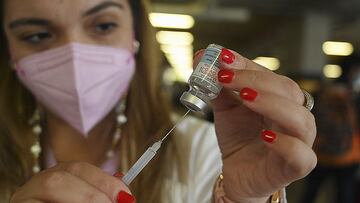How many covid-19 variants are there currently in the US?
Despite the Delta variant dominating the headlines, there are multiple other variants that pose a threat, including a new variant that is yet to be studied.


As of publication, the CDC says there are four 'variants of concern,' in the US. These are named, due to WHO guideline, Alpha, Beta, Gamma and Delta. Alongside these variants are the 'variants of interest,' and not all of these have WHO classifications yet, including the Eta, Iota, Kappa and Lambda variants.
The danger with variants is that there is a possibility one could mutate that is fully resistant to vaccines. Covid-19 cases need to be kept low to prevent mass spreads, but few countries are taking the approach to eliminate covid-19, instead choosing to 'live with the virus.'.
“If we don’t crush the outbreak to the point of getting the overwhelming proportion of the population vaccinated, then what will happen is the virus will continue to smolder through the fall into the winter, giving it ample chance to get a variant." https://t.co/hsCqzUKMSy
— The Hill (@thehill) August 5, 2021
What is the percentage of each variant in covid-19 cases?
As of the last batch of data from July 31, the main Delta variant makes up 83.4% of all cases in the US. Of the whole Delta WHO label, the variant makes up 93.4% of all cases. Just three months ago the variant was not even 10% of cases and the rise is due to its extremely quick rate of infection. Gamma makes up 1.3%, while Alpha makes up 2.9%. The Beta variant was sequenced 0.0% of times, but due to the possibility of mistakes it could have been 0.2%.
The different variants
More vaccine stories:
- Why are covid-19 hospitalizations increasing?
- Is the covid-19 vaccine effective against the Lambda variant?
- How can I show proof of vaccination on my phone?
- Can you get a covid-19 booster shot in the US?
- Who can force you to get a covid-19 vaccine?
Alpha - B.1.1.7
First identified in: United Kingdom
Attributes:
~50% increased transmission,
Potential increased severity based on hospitalizations and case fatality rates,
No impact on susceptibility to EUA monoclonal antibody treatments. Monoclonal antibodies are laboratory-made proteins that mimic the immune system’s ability to fight off harmful pathogens such as viruses,
Minimal impact on neutralization by convalescent and post-vaccination sera (vaccines).
Beta - B.1.351
First identified in: South Africa
Attributes:
Significantly reduced susceptibility to the combination of bamlanivimab and etesevimab monoclonal antibody treatment, but other EUA monoclonal antibody treatments are available,
Reduced neutralization by convalescent and post-vaccination sera.
Delta - B.1.617.2
First identified in: India
Attributes:
Increased transmissibility, twice as much as the alpha variant,
Potential reduction in neutralization by some EUA monoclonal antibody treatments,
Potential reduction in neutralization by post-vaccination sera.
Gamma - P.1
First identified in: Japan/Brazil
Attributes:
Significantly reduced susceptibility to the combination of bamlanivimab and etesevimab monoclonal antibody treatment, but other EUA monoclonal antibody treatments are available,
Reduced neutralization by convalescent and post-vaccination sera.
Other variants
These listed here are 'of interest' as the prevalence is low in the US. However, depending on their transmissibility, there is a chance they could become a dominant strain in the future.
Related stories
The Eta variant had 0.0% of cases in the US, but the Iota variant made up 0.2%. An unnamed variant, B.1.617.3, made up just over 1.1% of cases. Although not on the CDC list, the Lambda variant from Peru was identified in more than 1,000 cases in Texas. It was first sequenced in the US in April, and there are some worries that it may be resistant to vaccines.
All information provided by the CDC.

